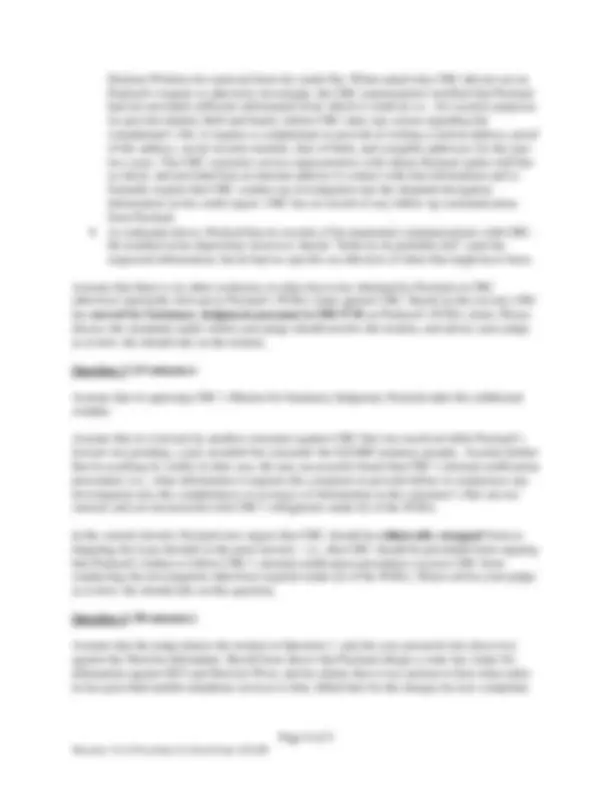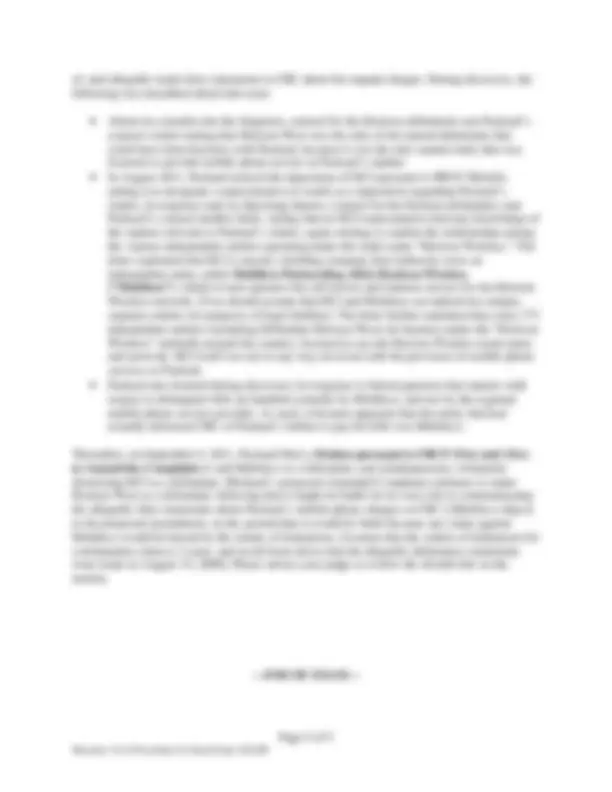




Study with the several resources on Docsity

Earn points by helping other students or get them with a premium plan


Prepare for your exams
Study with the several resources on Docsity

Earn points to download
Earn points by helping other students or get them with a premium plan
Community
Ask the community for help and clear up your study doubts
Discover the best universities in your country according to Docsity users
Free resources
Download our free guides on studying techniques, anxiety management strategies, and thesis advice from Docsity tutors
A case where a consumer, paul packard, discovered fraudulent charges on his credit card and mobile telephone account. He reported the fraud to the credit reporting agency, creditreportco (crc), and the mobile telephone provider, horizon wireless. However, crc failed to conduct an investigation into packard's dispute with horizon wireless, and horizon wireless reported unpaid charges to crc, negatively impacting packard's credit score. Packard then filed a lawsuit against crc and horizon wireless for violation of the fair credit reporting act (fcra) and defamation. Details of the complaint, the entities involved, and the arguments made in the case.
Typology: Exams
1 / 4

This page cannot be seen from the preview
Don't miss anything!



Page 2 of 5
Fact Pattern:
You are the judicial law clerk for the U.S. District Court judge assigned to the case described below. Your judge has asked your advice on how she should rule on a series of motions raised by the parties in the lawsuit. Here is the relevant summary of the proceedings:
In December 2008, Plaintiff Paul Packard discovered that fraudulent charges had been made to one of his credit cards. He alleges that he immediately contacted and filed a statement of identity theft with the San Francisco Police Department, where he lives. He also contacted CreditReportCo (“CRC”) , the nation’s primary consumer credit reporting agency, to report the fraud and to request that CRC add a security alert to his file.
Shortly thereafter, Packard discovered that this identity theft problem apparently had resulted in fraudulent activity on his mobile telephone account with Horizon Wireless. In January, 2009, Packard contacted Horizon to inform them that two fraudulent accounts had been opened in his name, and that fraudulent charges appeared on his legitimate account. Although Horizon terminated the fraudulent accounts the next day, Packard alleges that it refused to credit him for the fraudulent charges incurred on the legitimate account. After Packard failed to make payments on those charges for several months, Horizon closed that account and on August 14, 2009, it reported the unpaid charges to CRC, which negatively impacted Packard’s credit score. Packard now alleges that Horizon’s false statements to CRC about his unpaid charges were defamatory.
Packard also alleges that after learning that his credit score had been negatively impacted, he complained to CRC about the derogatory information in his credit report several times over the next two years, but that CRC failed to conduct the type of investigation required by the federal Fair Credit Reporting Act (FCRA), which provides in relevant part:
CRC concedes that it did not conduct any investigation into Packard’s dispute with Horizon (indeed, it admitted as much in its Answer to Packard’s Complaint). Instead, as explained more fully below, CRC asserts as an Affirmative Defense that Packard through his own actions waived his right to any such investigation.
On April 20, 2011, Packard filed his Complaint in the U.S. District Court for the Northern District of California (which was assigned to your judge). His complaint asserts a claim against CRC for violation of the above provisions of the FCRA, seeking the $10,000 statutory penalty.
Page 3 of 5
His complaint also seeks to join a state law claim for defamation against (1) Horizon Communications Inc., d/b/a Horizon Wireless (“HCI”) , and (2) Horizon Wireless West LLC, d/b/a Horizon Wireless (“Horizon West”). The Complaint states that because of the confusing nature in which numerous entities operate under the name “Horizon Wireless,” it was unclear to him which of the entities named in fact provided mobile telephone services to him and billed him for the charges he now complains of. Packard alleges that whichever of these Horizon Wireless entities in fact provided mobile telephone services to him defamed him when it allegedly made false statements to CRC about his unpaid charges, causing damages in excess of $75,000.
[Note that Packard also alleges, and you can assume he is correct, that the federal court has proper subject-matter jurisdiction over all these claims, in that the court has federal question jurisdiction over the FCRA claim against CRC, and has diversity jurisdiction over the defamation claim against HCI and Horizon West (both are Delaware corporations, and you can assume that the damages allegation on the defamation claim has been stated in good faith). You should also assume that the Northern District of California is a proper venue and that the court has personal jurisdiction over all these proposed defendants].
Question 1 (15 minutes):
HCI and Horizon West file a motion to sever the defamation claim against them from the FCRA claim against CRC, on the grounds that they have been improperly joined under FRCP 20. Please advise your judge as to how she should rule on that motion.
Question 2 (30 minutes):
With respect to the FCRA claim against CRC, assume that discovery has uncovered the following relevant evidence (all of which you can assume is admissible, or at trial can be presented in a form that would be admissible in evidence):
Page 5 of 5
of, and allegedly made false statements to CRC about his unpaid charges. During discovery, the following was unearthed about that issue:
Thereafter, on September 4, 2011, Packard filed a Motion pursuant to FRCP 15(a) and 15(c) to Amend the Complaint to add Mobileco as a defendant, and simultaneously voluntarily dismissing HCI as a defendant. [Packard’s proposed Amended Complaint continues to name Horizon West as a defendant, believing that it might be liable for its own role in communicating the allegedly false statements about Packard’s mobile phone charges to CRC.] Mobileco objects to the proposed amendment, on the ground that it would be futile because any claim against Mobileco would be barred by the statute of limitations. [Assume that the statute of limitations for a defamation claim is 2 years, and recall from above that the allegedly defamatory statements were made on August 14, 2009]. Please advise your judge as to how she should rule on the motion.